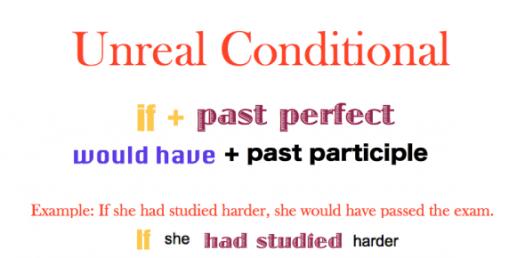Everything You Need to Know About Past Unreal Conditional-Inverted Sentence Structure
Lesson Overview
The Past Unreal Conditional, also known as the third conditional, is used to discuss hypothetical situations that did not happen in the past. It allows us to imagine alternate outcomes based on different past conditions. In formal writing, the inverted structure of these conditionals enhances clarity and sophistication.
Definition of Past Unreal Conditional-Inverted Sentence
The Past Unreal Conditional is a grammatical structure used to talk about hypothetical or imaginary events that did not happen in the past and their imagined results. It follows the structure:
- If-clause: Describes a condition that was not met (past perfect tense: had + past participle).
- Result clause: Describes the consequence that would have occurred if the condition had been met (modal + have + past participle).
Example:
- If she had studied, she would have passed the test. → She did not study, so she did not pass the test.
When using inversion, the sentence can be rewritten as:
- Had she studied, she would have passed the test.
This transformation is primarily used in formal or written English to make sentences more elegant and concise.
Another Example:
- Standard Form: If I had studied harder, I would have passed the exam.
- Inverted Form: Had I studied harder, I would have passed the exam.
The meaning remains the same, but the inverted form is often preferred in academic and formal contexts. This lesson will guide you through the structure, rules, common mistakes, and practical applications of the past unreal conditional in its inverted form.
Quiz to Understand Past Unreal Inversion:
Sentence Structure and Rules
To construct a past unreal conditional sentence, follow this structure:
| Standard Form | Inverted Form |
| If + subject + had + past participle, subject + would have + past participle. | Had + subject + past participle, subject + would have + past participle. |
| If she had listened to me, she wouldn't have failed. | Had she listened to me, she wouldn't have failed. |
Key Rules:
- Drop "if" and invert "had" and the subject in the conditional clause.
- Do not change the main clause (would have + past participle remains the same).
- For negative forms, place "not" after the subject: Had she not studied, she would have failed.
- "Had had" structure: If the verb in the condition is "have," retain both instances: Had he had more time, he would have finished.
- Use appropriate modals in the result clause: Had they practiced more, they could have won.
- Punctuation: When the inverted clause is at the beginning, use a comma: Had I studied, I would have passed. No comma is needed if the inverted clause follows the main clause: I would have passed had I studied.
Common Mistakes and Corrections
| Mistake | Correction | Explanation |
| Had not she prepared, she would have failed. | Had she not prepared, she would have failed. | "Not" follows the subject in negative inversion. |
| If she would have studied, she would have passed. | Had she studied, she would have passed. | "Would have" should not be used in the condition clause. |
| Had I knew, I would have acted differently. | Had I known, I would have acted differently. | The past participle "known" is needed. |
Take the Past Unreal Sentence Quiz
Examples and Explanations
| Standard Form | Inverted Form | Explanation |
| If I had seen the sign, I would have stopped. | Had I seen the sign, I would have stopped. | Expresses a past hypothetical event that did not occur. |
| If they had left earlier, they could have avoided traffic. | Had they left earlier, they could have avoided traffic. | Shows an alternative past possibility. |
| If she had worked harder, she might have been promoted. | Had she worked harder, she might have been promoted. | Demonstrates a past unreal conditional using "might have." |
Practice Questions
Rewrite the following in the inverted past unreal conditional form:
- If you had told me earlier, I would have helped you.
- If our teacher had explained the topic better, we might have understood it faster.
- If I had known about the deadline, I would have prepared.
- If they had not forgotten the tickets, they would have entered the concert.
- If she had had more time, she would have completed the project.
Identify and correct the errors:
- Had not they arrived on time, they would have missed the event.
- Had I would have known about the change, I would have planned accordingly.
- If she had knew the answer, she would have responded immediately.
- If we would have prepared better, we might have won the match.
- Had he been there, he would help us.
Memory Aids and Tips
- One "Had," One "Would Have" Rule: Only one clause should have "had" and only one should have "would have."
- Practice with Set Phrases: Had I known… Had it not been for… Had she not…
- Transformative Exercise: Rewrite standard third conditional sentences into their inverted forms for practice.
- Listen for Usage: Pay attention to real-world examples in books, articles, and formal speeches.
Rate this lesson:
 Back to top
Back to top

(131).jpg)